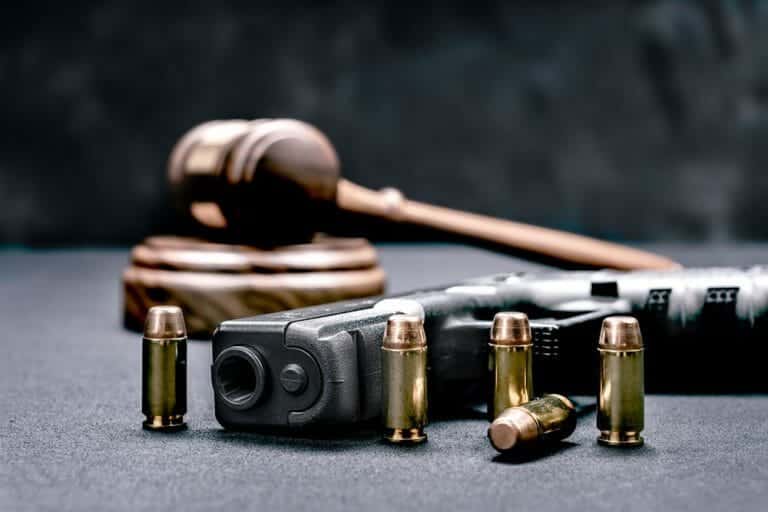Ownership of Firearms without Serial Numbers Case Appealed
U.S.A. –-(AmmoLand.com)- The ground-breaking case of USA v. Randy Price has been appealed to the Fourth Circuit Court of Appeals. The notice of appeal was filed on October 24, 2022. The appointment of a federal public defender was made on October 26, 2022.
The Fourth Circuit appointed the Federal Defender for the Southern District of West Virginia to represent Randy Price in this case.
Presumably, this is the same attorney who represented Price in the District Court, Wesley P. Page, Federal Public Defender s/Lex A Coleman, WV Bar No. 10484.
The case was discussed in a previous article on AmmoLand.
The potential for strengthening Second Amendment Protections, in this case, are notable and important. This case has a few implications for criminal action in the United States.
The law found unconstitutional in this case, 18 U.S.C. §§ 922(k), was not formed until 1990. It is late law, constitutionally, and has no significant historical precedence.
The suspect in this case, Randy Price, may not be the person most sympathetic. Price is a convicted felon. He is prohibited from possessing firearms, by federal law.
The District Judge, Joseph R. Goodwin, found the arguments to declare the law prohibiting possession of a firearms whose serial number had been removed, to be unconstitutional, and persuasive, given the guidance of the Bruen decision on the Second Amendment by the Supreme Court.
Judge Goodwin found the prohibition of a felon possessing firearms to be constitutional under the Bruen decision.
Under this decision, a felon is barred from legally possessing firearms under federal law.
People who may legally possess a firearm may not be prosecuted for possessing a firearm that has had the serial number altered or removed.
Federal law forbids the creation of a federal registration system.
No such rule or regulation prescribed after the date of the enactment of the Firearms Owners’ Protection Act may require that records required to be maintained under this chapter or any portion of the contents of such records, be recorded at or transferred to a facility owned, managed, or controlled by the United States or any State or any political subdivision thereof, nor that any system of registration of firearms, firearms owners, or firearms transactions or dispositions be established. Nothing in this section expands or restricts the Secretary’s [Attorney General’s] authority to inquire into the disposition of any firearm in the course of a criminal investigation.
Eight states forbid state level registration systems.
State registration systems are constitutional latecomers.
If the decision showing 18 U.S.C. §§ 922(k) is upheld. The ability of state and federal governments to use registration systems as a means of disarming the public, will be rendered toothless.
The reason universal gun registration is so dangerous that it is forbidden in federal law, is gun registration is gun confiscation, without the general pain and expense of door-to-door searches and confiscations required before registration systems were conceived.
If there is a general gun registration scheme in existence, such as exists in Australia and many European countries, all legal guns must be registered; any gun not registered is illegal.
When a government decides to confiscate, whether individually or wholesale, it need only demand the guns which are registered be turned in on pain of punishment. Punishment in a modern state can consist of anything from cancellation of drivers licenses, freezing of bank accounts to turning off power and water services. This is much easier and less dangerous than house-to-house searches.
This becomes moot without serial numbers to connect an individual to an individual gun.
The United States has done well without a general registration system. Registration systems have virtually no effect on violent crime. They cost considerable police resources. They primarily victimize law abiding gun owners. Many such schemes attempt to pass most of the costs of the system to those who choose to exercise the right protected by the Second Amendment. Those costs, by their nature, suppress the legitimate use of Second Amendment rights.
It will be interesting to see if deep thinkers and Second Amendment strategists will be filing Amicus briefs in favor of upholding Judge Goodwin’s decision.
Attorneys from the NRA, SAF, GOA, Calguns, and other state groups, should all be looking at this case closely.
If law-abiding people cannot be prosecuted for possessing a firearm from which the serial number has been removed, the entire scheme of national gun registration falls apart.
About Dean Weingarten:
Dean Weingarten has been a peace officer, a military officer, was on the University of Wisconsin Pistol Team for four years, and was first certified to teach firearms safety in 1973. He taught the Arizona concealed carry course for fifteen years until the goal of Constitutional Carry was attained. He has degrees in meteorology and mining engineering, and retired from the Department of Defense after a 30 year career in Army Research, Development, Testing, and Evaluation.





